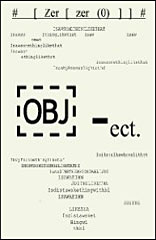
The Animal by Louis E. Bourgeois is the most challenging collection I’ve read in quite some time. Although it bears the subtitle, Prose Poetics, I would be inclined to refer to it as a collection of parables and aphorisms, and I know, from having read Complete with Missing Parts: Interviews with the Avant-Garde, an anthology edited by Bourgeois, that he holds both of these genres in high regard.
Bourgeois’s modus operandi is alluded to in a quote that precedes the text. The quote is by Antonin Artaud, the French director and poet credited with developing the Theatre of Cruelty, and reads as follows: “Man on earth is bored to death and this boredom is buried so deeply within him that he now no longer knows it.”
I can’t say for sure whether Artaud was influenced by Søren Kierkegaard, but I strongly suspect that he was and, as proof of my assertion, let me quote a few lines from page 286 of Either/Or (Princeton University Press, 1987): “The gods were bored; therefore they created human beings. Adam was bored because he was alone; therefore Eve was created. Since that moment, boredom entered the world and grew in quantity in exact proportion to the growth of population.”
Franz Kafka found Kierkegaard’s adage to boredom so inspiring, he decided to pen one of his own: “Everything feels itself to be a thought, even the vaguest feelings. I hate everything that does not relate to literature, conversations bore me (even if they relate to literature), to visit people bores me, the sorrows and joys of my relatives bore me to my soul. Conversations take the importance, the seriousness, the truth of everything I think.” (July 21, 1913, Diaries.)
Bourgeois is following in the tradition of Artaud, Kierkegaard and Kafka. Some random samplings from The Animal will indicate what I am getting at: 1) from the prose poem, “The Wise Man”: “There is no experience worth having, he thought. There is nothing left that I want to know. There is no one with whom I want to talk. There is no painting or ocean that intoxicates me;” 2) from “The Anti-Natural”: “The thought of rock formations sickened him….if he couldn’t have exclusive rights to all the dust in the world, then he didn’t want dust to exist anymore;” 3) from “Dead Sky”: “This time it’s a fundamental malaise…;” and 4) from “Statements Against Existence”: “Does this mean that life will repeat itself from the first moment to the last? If so, it will be imbued with the same futility as before.”
There is a defining conundrum in The Animal: Do things exist in and of themselves or do they depend on our minds for their existence? If they depend on our minds for their existence, then there is no limit to the degradation we can subject them to ...
The Animal that is being dissected here is, of course, Man. In particular, Bourgeois is examining Man’s contrary nature: the nature that forces him to conquer the world (because otherwise life would be endlessly boring) and the nature that allows him to realize that his efforts are pointless. The prose poem, “Alexander the Great,” is a good exam-ple of this:
At least, he thought, at least it would be better than this terrible nothingness that has crawled into my heart and will not leave. “Everything is the same,” he cried out loud to no one but himself, “nothing I have done makes one bit of sense.”
Or consider “Heidegger Playing with Children,” in which you’ll find the following lines:
Gather ’round me boys and girls; see, this is not a fish. This is definitely not a fish and if you look above, you’ll see there is no sky there, nor has there ever been a sky… The only reality is ash. Jewish ash and stardust ash.
It is obvious from the above passages that Bourgeois is working in the tradition of writers whose thinking has dissociated them from life but who then, in the manner of De Sade, seek acts of violence and degradation in order to prove to themselves that they exist. Take, as a further example, the poem, “The Monster of Village Z”:
He could not be sated; all the cormorants we brought him, all the blood sacrifices wasted on him… WILL THE REVOLUTION NEVER COME?... Until that day comes when he’ll die of Boredom, all our sacred birds will be extinguished, even though we’ll have total freedom.
There is a defining conundrum in The Animal: Do things exist in and of themselves or do they depend on our minds for their existence? If they depend on our minds for their existence, then there is no limit to the degradation we can subject them to—at least in Bourgeois’s world. Take, for example, his poem, “Thoughts of a Healthy Man,” in which you’ll find the following passage:
…but he knew in advance of these objects that his imagination was a greater acknowledgment of their presence, their raison d’étre… For once, he was truly frightened by what his imagination beheld; every night for a week he dreamed of them screaming in an indescribable voice…
The Animal is not an easy book to read. It begs to be studied, and to be studied in the context of the traditions I have alluded to in this review. But, if I might be allowed an observation, I think Bourgeois is carving out a considerable niche for himself in literature on this side of the Atlantic. Indeed, I would contend that he is a major ‘French’ voice in American letters.

